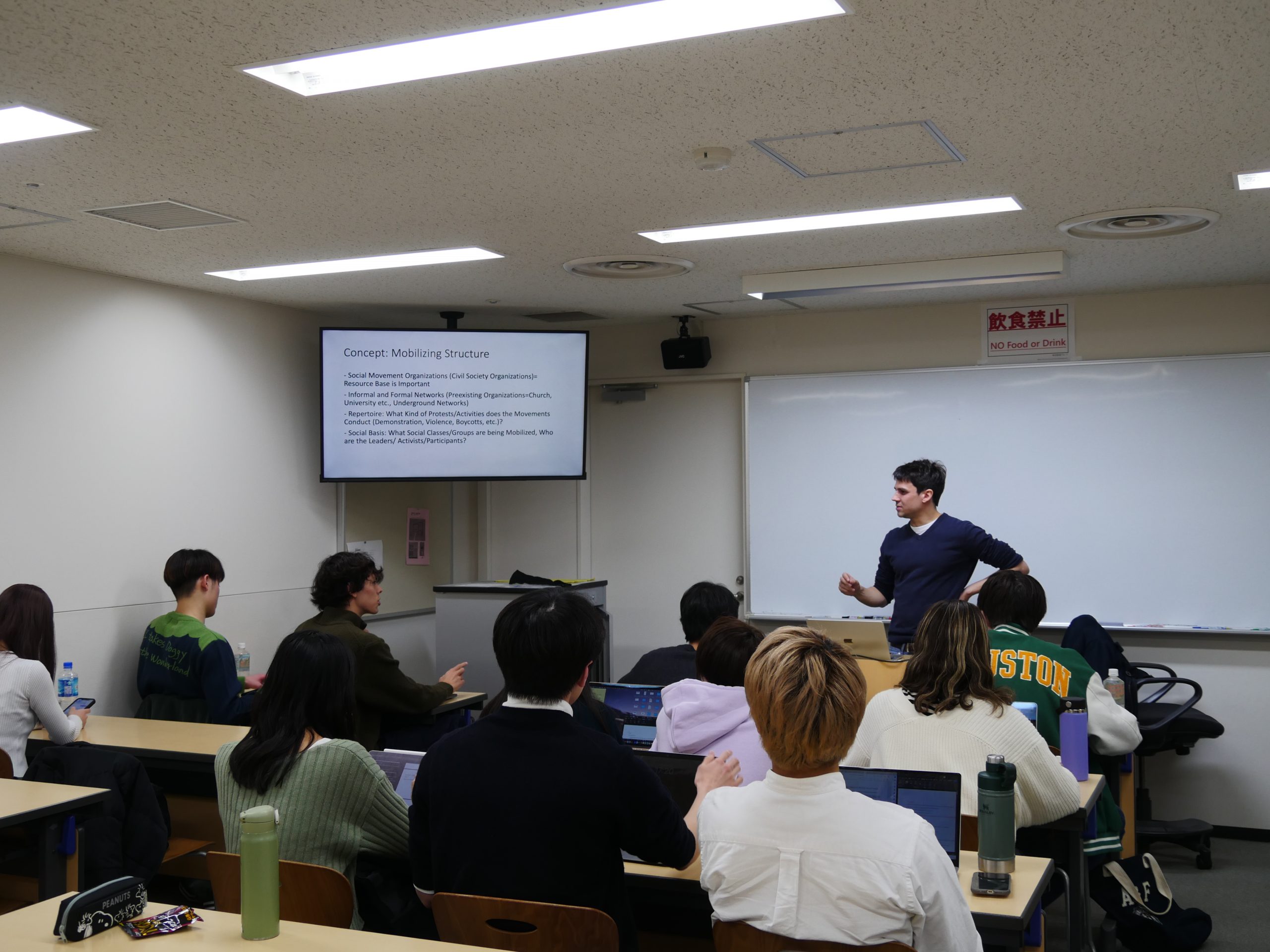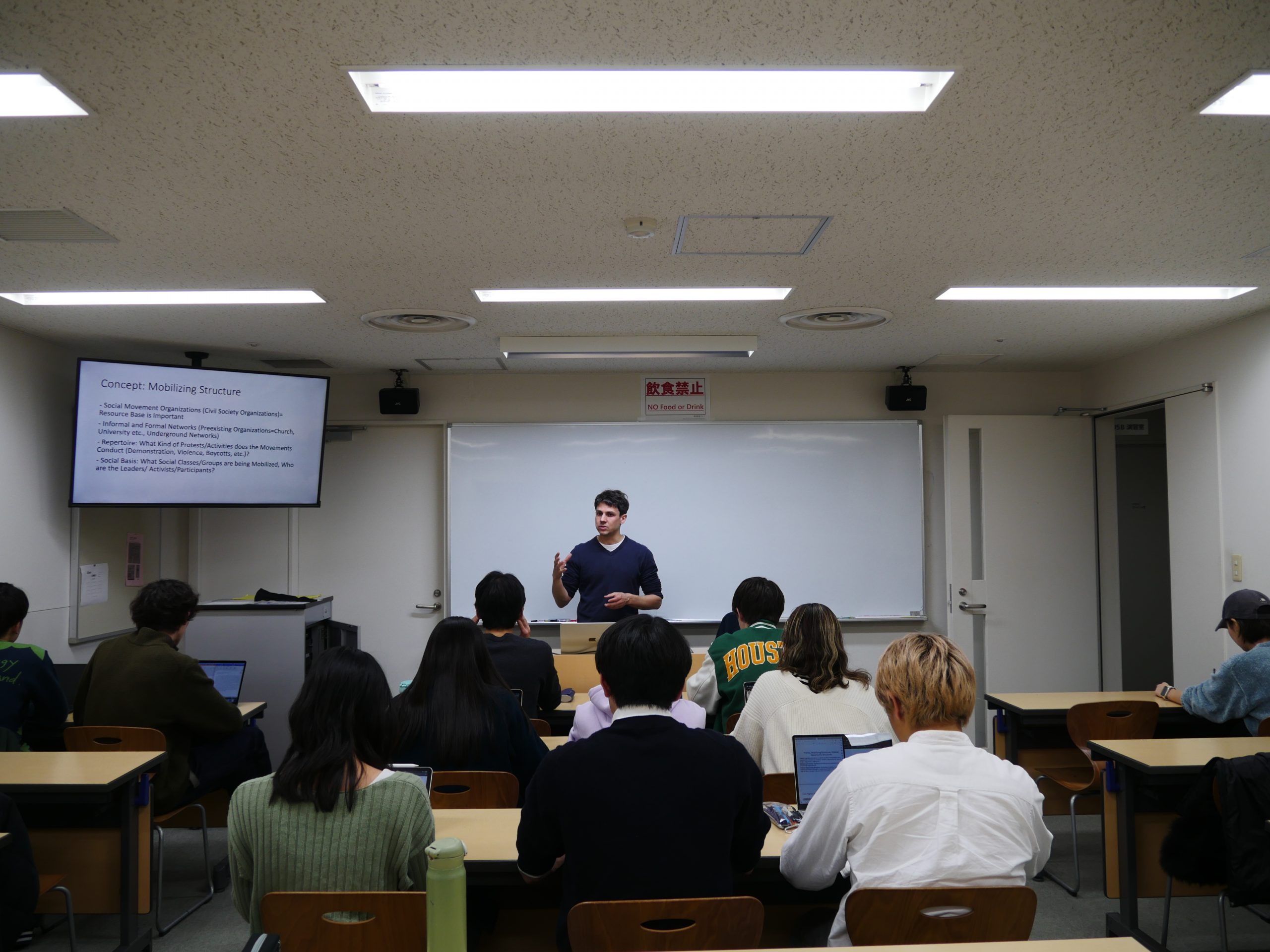Class Introduction:Basics of Theories of Civil Society B
Comment from Professor:
In this course, I give an Introduction to basic concepts and theories of civil society and social movements. I aim to situate Japanese civil society phenomena in the wider field of studies of civil society. In more concrete terms, I first give an overview of general theories of civil society and social movements (which are a part of civil society) and then in the second half of the course, I introduce more specific instances of social movement activity in Japan and beyond. An important topic of social movement studies is (also in terms of theory building) the American Civil Rights Movement, which regularly becomes a topic of my courses. However, we also deal with social movements like the movement of victims of Japan’s system of wartime prostitution and the counter movement against it as well as Hongkong’s prodemocracy protests.
I try to give my students an understanding of the relation between the analysis of concrete phenomena and the use of theory and concepts. To analyze social movement activity in-depth, I usually show a movie and analyze it with the students during class. I use presentations to introduce the basic concepts and theories, but since the class size of this class is usually small, I put some emphasis on discussion and repetition in the classroom. It can be challenging to deal with different English levels of the students participating, but I try to get a grip of how much of my lecture the students actually understand by regularly asking questions and having people state their opinion on the content.

Class Interview
Q1 Outline of the class.
During classes, students learn about a variety of theories on the study of civil society. Students are able to apply the theories they have learned through discussions based on case studies related to civil society and the development of social movements in Japan as well as other countries and regions. Time is given during the latter half of the classes for question led discussions facilitated by the professor.
Q2 Why did you decide to take this class?
I am most interested in Middle East studies, particularly in democratic movements such as the Arab Spring, as well as the political and social development of Kurdish ethnic organizations and parties in Tukey and Iraq. I decided to take this course so I could learn about civil society and social movements then apply that knowledge during my third and fourth year studies.
Q3 What did you find attractive about this class?
The opportunity to talk about and apply the theories learned in class during the discussions is a big attraction as it allows for a deeper understanding of the subject. The fact that the lectures are conducted in English is another draw for English learners. Although the level of the content is advanced, I felt that the professor was very good at assessing the students’ level of understanding as we progressed which was yet another point for the class.
Q4 How do you want to connect what you learned in the class to the next?
As mentioned above, the most important thing is that I want to link this to my research during the third and fourth year seminars. In the future, I would also like to focus more on civil society actors and be able to grasp the politics, society, culture and economics of different parts of the world.
(Simon De Turck, 2nd year, Faculty of Global Studies)

Q1 Outline of the class.
This class is conducted in English. The class mainly focuses on Japanese civil society with some case studies. We learn about some basic theories of civil society as well. In this class, we sometimes watch videos related to civil society and discuss our thoughts and opinions with classmates in order to deepen our learning. Since the class is small, it allows us to be actively involved through discussions.
Q2 Why did you decide to take this class?
There are two reasons why I decided to take this class. First, I wanted to take a class that is conducted in English so that I can improve my English skills at the same time. I also wanted to discuss global issues related to civil society with classmates in English. Second, I was interested in learning about civil society since I had never learned about it before. When I heard the phrase ‘civil society’, I only had a blurred image of it such as protests and NGOs, so I wanted to learn more deeply about what civil society is.
Q3 What did you find attractive about this class?
I think the attractive point of this class is that we have opportunities to express our opinions during the class since it is smaller than other classes. I also found it attractive to learn about connections between civil society and the government. This course allows me to gain both local and global perspectives, as we do not only focus on civil society in each country but also how it is affected globally.
(1st year, Faculty of Global Studies)
